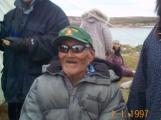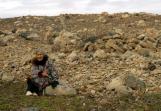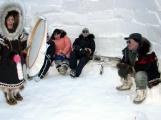1
Elders are very much respected in Cambridge Bay. They are the most experienced people in this community, and are very knowledgable in Inuit traditional practices and values. Many experienced a hard life when they were growing up, and they like to share their experiences with the younger generation so that the culture will not disappear. However, they have realized that young people these days are not always interested in their ancestral past.Elders love sharing their stories, especially those relating to when they were children themselves. Their stories tell us about Inuit culture before all the modern technology arrived.
Here are the stories of some of the elders that had participated in a project known as "Iqaluktuuq - oral history interviews", conducted in 2000 & 2001. Most of the elders do not understand or speak English, and therefor these stories required translation. Their interviews say much about not only modern Inuit culture, but also about early Inuit life.
3
Frank Analok, the eldest elder in the community, was born in 1918 around Ikpigjuaq, near Cambridge Bay. His knowledge of traditional Inuit culture is vast, and he knows much about prehistoric tools that have not been used for some time.In the Iqaluktuuq interview, he reminisced about hunting and fishing at Iqaluktuuq. He remembered that people used to kayak to the area, where they would catch fish with fish spears, and hunt musk-ox and caribou with bow and arrow before rifles arrived. He was taught to use bows and arrows as a child. The area is still a popular fishing place today, with people travelling there by boat or quad (all terrain vehicle).
"I remember growing up here. When I was a little boy we would be camping here at Iqaluktuuq. We would be out here fishing in the late spring, early summer. In those days people would be fishing just with kakivait (spears)...in the summertime people would fish with spears, and in the winter they would use jiggers to catch fish..." .
"They hunted musk-ox in those days with bows and arrows and they used dogs to help them with the hunt. They hunted with bows and arrows in those days before the rifle was introduced. Dogs were used to help them hunt musk-ox..."
Frank Analok.
5
Mabel Ekvanna Angulalik, who was married to the great fur trader, Stephen Angulalik, was born in 1925. She was born in the mainland and grew up in Perry River. She moved to Cambridge Bay in 1967, along with her husband and children.In the Iqaluktuuq interview, she told us many things about her late husband, who passed away in 1980. She particularly remembered the role of women in those days.
"The woman's work is when a husband catches game, the wife's work would be to do food preparations such as making dry fish and meat. Working on caribou and seal skins drying, scraping and making clothing. Sewing skins for clothing. Making sure the qulliq is always lighted and burning brightly. They also reared children."
Mabel Ekvana Angulalik
Interviewed by David Pelly.
7
Tommy Kilaudluk was born in 1935 and grew up at Bathurst Inlet. He moved to Cambridge Bay in 1956 when he started working at the DEW Line. He married Mary Natik Kilaudluk in 1958, who also lived here; both still live in Cambridge Bay today.He was very interested in the archaeology work that has been conducted for the past several years by Dr. M. Friesen of University of Toronto.
"When the archaeologist mentioned about this area (Iqaluktuuq) that there are a number of old sites which are quite large, even though it did not seem that way to us, I was amazed at how large they are. It was not a big surprise to me because I've often heard stories about them..."
Tommy Kilaudluk
His thoughts of the young people today, also reflects on how the Inuit culture is at risk.
"I just want to mention that our children now seem not to want to listen to how our ancestors lived long ago. Even for me, I've forgotten a few things about the old ways. And that is why recording our stories might be of help to people out there."
Tommy Kilaudluk
Mary Natik Kilaudluk was born in 1943. She grew up traveling with her parents between Bathurst Inlet and Contwoyto Lake a lot. She moved to Cambridge Bay during the mid-50s when her father started working at the DEW Line. She has this to add about the young generation today.
"I'd like to talk to the younger generation about long ago but it seems like now-a-days the youths do not want to listen and are ignorant of how our traditions were then...but hopefully one of these days they'll wake up and try not to forget the old ways of our fathers." Mary Kilaudluk
Interviewer David Pelly. 2001 at Iqaluktuuq


